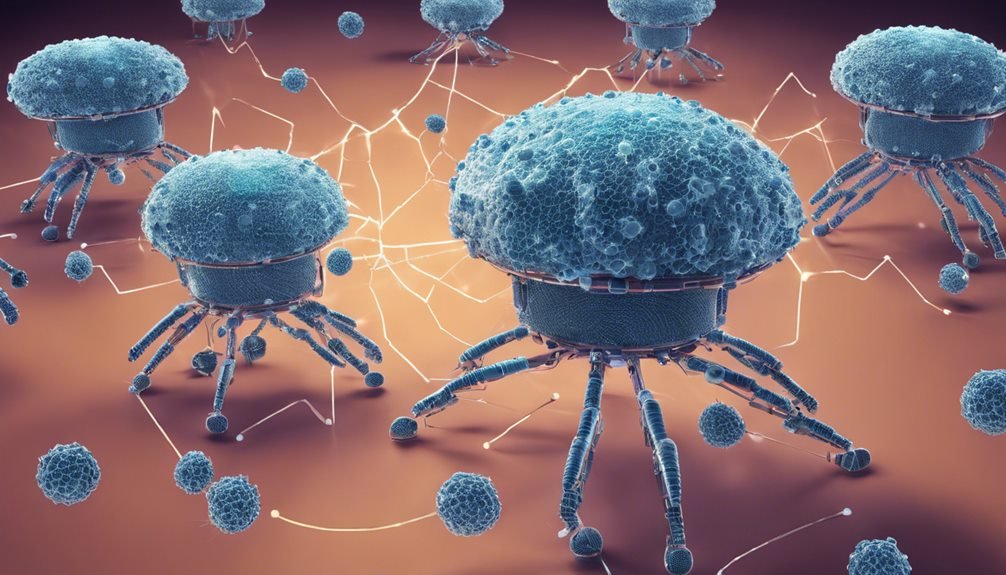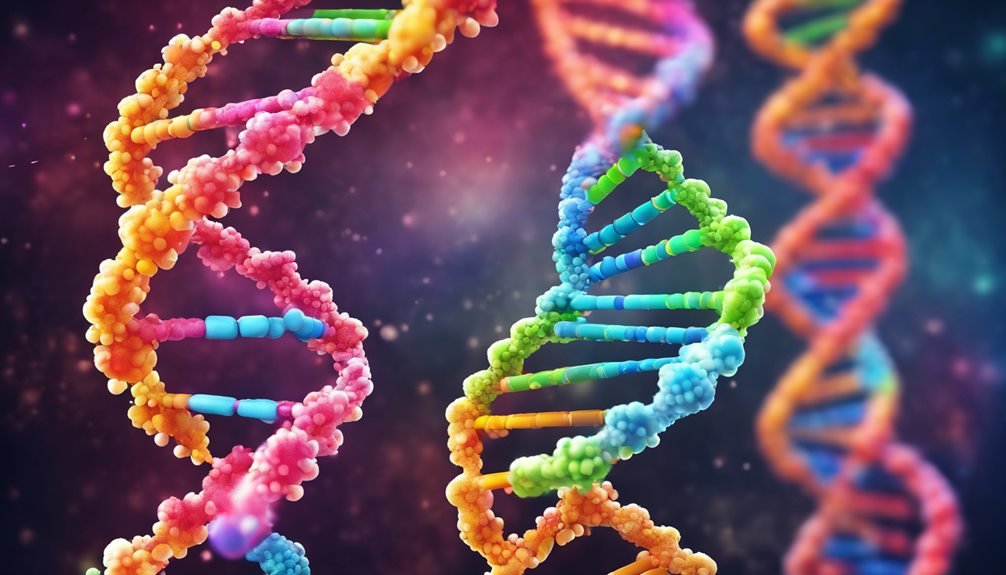You may have heard whispers of groundbreaking cancer treatments that extend beyond traditional radiation therapy. These innovative approaches are reshaping the way we combat this disease, offering new avenues for treatment that hold promise for improved outcomes and personalized care. From targeted immunotherapy to precision medicine advancements, the realm of cancer treatment is evolving rapidly. Stay tuned to explore the cutting-edge strategies that are paving the way for a brighter future in the battle against cancer.
Key Takeaways
- Targeted Immunotherapy offers tailored treatment harnessing the immune system against cancer cells.
- Precision Medicine tailors treatments based on genetic makeup for more effective outcomes.
- Nanotechnology delivers targeted therapies minimizing side effects and enhancing treatment efficacy.
- Innovative Therapies like Epigenetic and Virus-Based approaches offer personalized strategies against cancer.
- Stem Cell Transplantation aids in recovery, regenerating healthy cells and boosting the immune system.
Targeted Immunotherapy
When facing cancer, targeted immunotherapy offers a promising approach that harnesses the power of the immune system to specifically attack cancer cells. Personalized immunotherapy tailors treatment to an individual's specific cancer type, enhancing effectiveness while minimizing side effects. This novel targeted therapy works by identifying unique markers on cancer cells, allowing the immune system to recognize and destroy them with precision.
For those seeking to serve others, understanding targeted immunotherapy can provide hope and insight into cutting-edge cancer treatments. By leveraging the body's own defenses, personalized immunotherapy offers a more tailored and potentially less invasive option compared to traditional treatments like chemotherapy or radiation therapy.
This approach not only targets cancer cells more directly but also has the potential to create long-lasting immunity against cancer recurrence.
CAR-T Cell Therapy
CAR-T cell therapy is a groundbreaking form of cancer treatment that involves modifying a patient's own immune cells to better target and destroy cancer cells. This innovative therapy has shown remarkable clinical effectiveness, particularly in certain types of blood cancers, where traditional treatments may have been less successful. Here are three key points to consider about CAR-T cell therapy:
- Personalized Approach: CAR-T cell therapy is tailored to each individual, utilizing their immune cells to fight cancer specifically in their body. This personalized approach holds promise for more effective and targeted treatment outcomes.
- Long-lasting Effects: Studies have shown that CAR-T cell therapy can lead to long-term remission in some patients, offering hope for a sustained response to treatment.
- Future Advancements: Ongoing research in CAR-T cell therapy aims to broaden its application to solid tumors and improve its safety profile. These future advancements hold the potential to revolutionize cancer treatment further.
As this cutting-edge therapy evolves, it offers a glimpse into the future of cancer care, emphasizing the importance of continual advancements in medical science to better serve those fighting cancer.
Precision Medicine Approaches

Moving forward from the realm of CAR-T cell therapy, another innovative approach in cancer treatment that is making significant strides is Precision Medicine Approaches. This approach focuses on tailoring treatment strategies to individual patients based on their unique genetic makeup. Through personalized diagnostics and genomic profiling, healthcare providers can identify specific genetic alterations driving a patient's cancer, enabling targeted therapies for better outcomes.
| Precision Medicine Approaches | Benefits |
|---|---|
| Personalized Diagnostics | Allows for precise identification of genetic mutations driving cancer, leading to targeted treatment plans tailored to each patient's needs. |
| Genomic Profiling | Helps in understanding the genetic composition of tumors, guiding healthcare providers in selecting the most effective therapies with fewer side effects. |
Therapeutic Vaccines
Harnessing the power of the immune system, Therapeutic Vaccines offer a promising avenue in the realm of cancer treatment. These Personalized cancer vaccines are tailored to target specific cancer cells, training your immune system to recognize and destroy them effectively. Immunotherapy advancements in the form of therapeutic vaccines have shown great potential in activating the body's natural defenses against cancer cells, offering a more targeted and precise way to fight the disease.
- Personalized cancer vaccines: Tailored to target specific cancer cells.
- Immunotherapy advancements: Utilizing the body's natural defenses to combat cancer.
- Precision targeting: Offering a more targeted and precise way to fight the disease.
Therapeutic vaccines hold promise in not only treating cancer but potentially preventing its recurrence. By boosting the immune response against cancer cells, these vaccines aim to provide a more sustainable and long-term solution to combat various types of cancers.
As research in this field progresses, the hope is to refine and optimize these vaccines to offer even greater efficacy and fewer side effects, providing new hope in the fight against cancer.
Nanotechnology in Treatment

Navigating the vast landscape of cancer treatments, you may find yourself intrigued by the innovative realm of Nanotechnology in Treatment. Nanotechnology applications offer a promising avenue for more effective and targeted cancer therapies. Through personalized delivery systems, nanotechnology enables the precise delivery of medications directly to cancer cells, minimizing damage to healthy tissues.
These microscopic particles can carry drugs or target specific areas within the body, enhancing treatment outcomes and reducing side effects. Nanotechnology also allows for the development of imaging techniques that can detect cancer at an early stage, improving diagnosis and prognosis.
By harnessing the power of nanotechnology, researchers are continuously exploring new ways to combat cancer and improve patient outcomes. The ability to tailor treatments to individual patients based on their unique genetic makeup and tumor characteristics showcases the potential of personalized medicine in oncology.
Embracing the advancements in nanotechnology offers hope for more effective and less invasive cancer treatments, ushering in a new era of precision medicine in the fight against cancer.
Adoptive Cell Transfer
Exploring the realm of cancer treatments, one approach that stands out for its potential is Adoptive Cell Transfer. This innovative technique involves harnessing the power of the immune system to fight cancer effectively. Here's what you need to know about this cutting-edge treatment:
- Personalized Immunotherapy: Adoptive Cell Transfer is a form of personalized immunotherapy where immune cells are extracted from the patient, modified or expanded in the lab to enhance their cancer-fighting abilities, and then reinfused back into the patient to target and destroy cancer cells specifically.
- Enhanced Tumor Targeting: Through Adoptive Cell Transfer, immune cells such as T cells or natural killer cells are engineered to recognize and attack cancer cells more effectively, leading to enhanced tumor targeting and destruction while minimizing damage to healthy tissues.
- Promising Results: Clinical trials have shown promising results with Adoptive Cell Transfer, demonstrating significant tumor regression and prolonged survival rates in certain types of cancer patients, offering hope for improved outcomes in the fight against cancer.
Tumor-Treating Fields (TTFields)

Utilizing Tumor-Treating Fields (TTFields) is a novel approach in cancer therapy that involves the application of low-intensity electric fields to disrupt cancer cell division. This innovative technology, known for its electrical stimulation, offers a promising strategy to combat cancer. By delivering these low-intensity electric fields through a device worn on the body, TTFields can interfere with the process of cell division, ultimately inhibiting tumor growth.
The application of TTFields is a non-invasive method that targets cancer cells while minimizing harm to surrounding healthy tissues. This novel technology has shown efficacy in various types of cancers, providing patients with a new treatment option that can be used in combination with other therapies. By disrupting cancer cell division, TTFields offer a unique and personalized approach to cancer treatment.
As research continues to advance in the field of oncology, TTFields represent a significant step forward in the quest for more effective and targeted cancer therapies. Embracing this innovative approach demonstrates a commitment to exploring diverse treatment options for individuals facing cancer diagnoses.
Angiogenesis Inhibitors
An essential component in the realm of cancer treatment involves the use of angiogenesis inhibitors. These innovative medications work by targeting the process of angiogenesis, which is the formation of new blood vessels that tumors rely on for growth and metastasis. Here are three key points to consider:
- Anti-angiogenesis Research: Ongoing research in anti-angiogenesis therapies has shown promising results in inhibiting tumor growth by cutting off their blood supply. Clinical trials are essential to evaluate the effectiveness and safety of these treatments in various cancer types.
- Novel Angiogenesis Inhibitors: Scientists have developed novel angiogenesis inhibitors that target specific pathways involved in blood vessel formation around tumors. These inhibitors disrupt the tumor's ability to access nutrients and oxygen, ultimately impeding their growth.
- Mechanisms: Angiogenesis inhibitors work through various mechanisms, such as blocking specific growth factors or signaling pathways that promote blood vessel formation. Understanding these mechanisms is crucial for developing targeted therapies that can effectively starve tumors of their blood supply.
Epigenetic Therapies

Epigenetic therapies offer a groundbreaking approach to cancer treatment by targeting the mechanisms that regulate gene expression without altering the underlying DNA sequence. Gene regulation plays a crucial role in cancer development and progression. This innovative treatment focuses on modifying gene activity to suppress cancer growth and spread, offering new hope for patients.
Chromatin remodeling, a key aspect of epigenetic therapies, involves modifying the structure of chromatin – the complex of DNA and proteins where genes reside. By altering how tightly DNA is packed, these therapies can either activate or deactivate specific genes involved in cancer. This precise targeting helps in inhibiting tumor growth and metastasis.
Understanding the importance of epigenetic therapies in cancer treatment can inspire hope for those seeking alternative approaches. By addressing gene regulation and chromatin remodeling, these treatments pave the way for personalized and effective strategies to combat cancer. Embracing these advancements can lead to improved outcomes and quality of life for individuals battling this complex disease.
Virus-Based Therapies
Virus-based therapies represent a cutting-edge approach in cancer treatment, harnessing the power of viruses to target and destroy cancer cells. This innovative method utilizes viral vectors, which are altered viruses designed to deliver genetic material into cancer cells, helping the immune system recognize and attack them. Oncolytic viruses, another key player in this treatment, are viruses that selectively infect and kill cancer cells while leaving healthy cells unharmed. Here's why this approach is making waves in the field of oncology:
- Precision Targeting: Viral vectors can be engineered to specifically target cancer cells, minimizing damage to surrounding healthy tissues.
- Immune System Activation: Oncolytic viruses not only kill cancer cells directly but also stimulate the immune system to mount a stronger response against the tumor.
- Potential for Personalization: Researchers are exploring ways to tailor virus-based therapies to individual patients, offering a more personalized and effective treatment approach.
Photodynamic Therapy

Harnessing the power of light to target and treat cancer cells, Photodynamic Therapy (PDT) is a promising approach in cancer treatment. Through light activation, PDT uses a photosensitizing agent that, when exposed to specific wavelengths, produces a form of oxygen that kills nearby cancer cells. This targeted method minimizes damage to surrounding healthy tissue, making it a favorable option for certain types of cancer.
The process involves administering the photosensitizing agent, allowing time for it to accumulate in cancer cells, and then exposing the tumor to light. This light activation leads to tumor destruction, disrupting the blood supply to the cancer cells and triggering cell death.
PDT can be used alone or in combination with other treatments like surgery or chemotherapy, providing a versatile approach to fighting cancer.
With ongoing research and advancements in technology, Photodynamic Therapy continues to show promise in treating various types of cancer. Its ability to specifically target cancer cells while minimizing damage to healthy tissue makes it a valuable tool in the fight against cancer.
Stem Cell Transplantation
Utilizing the power of stem cells in cancer treatment, Stem Cell Transplantation is a cutting-edge approach that holds great promise in combating certain types of cancer. This innovative method involves the infusion of healthy stem cells into your body to replace damaged or diseased cells, aiding in the fight against cancer.
Here are three key points about Stem Cell Transplantation:
- Stem Cell Sources: These specialized cells can be sourced from bone marrow, peripheral blood, or umbilical cord blood. Each source has unique characteristics that make them suitable for different types of cancers.
- Transplantation Process: The process involves several steps, including harvesting stem cells from the chosen source, conditioning therapy to prepare your body, and the actual transplantation of stem cells into your system. This process helps your body recover from the effects of cancer treatments.
- Hope and Healing: Stem Cell Transplantation offers hope by providing a way to regenerate healthy cells and boost your immune system to combat cancer more effectively. It's a beacon of healing in the journey towards overcoming cancer.
Frequently Asked Questions
Can Targeted Immunotherapy Be Combined With Traditional Cancer Treatments?
Yes, targeted immunotherapy can be combined with traditional cancer treatments. This personalized approach involves tailoring treatment combinations to your specific cancer type. By utilizing immunotherapy alongside traditional methods like chemotherapy or radiation, it can enhance the body's immune response to fight cancer cells more effectively.
This innovative approach shows promise in improving treatment outcomes and may offer new hope in the fight against cancer.
How Long Does It Take for CAR-T Cell Therapy to Show Results?
When undergoing CAR-T cell therapy, you may see initial results within a few weeks to months. The treatment timeline varies, and patient outcomes can differ. While some individuals experience positive responses relatively quickly, others may take longer to see significant improvements.
It's essential to follow up with your healthcare team regularly to monitor efficacy and address any potential long-term effects. Stay hopeful and discuss any concerns with your medical providers.
Are There Genetic Tests Available for Precision Medicine Approaches?
Absolutely, genetic tests are available for precision medicine approaches. Through genetic counseling, individuals can undergo pharmacogenomic testing to determine the most effective treatment options based on their unique genetic makeup. This personalized medicine approach helps optimize treatment efficacy by tailoring interventions to each individual's genetic profile.
What Types of Cancers Are Therapeutic Vaccines Most Effective Against?
Therapeutic vaccines are most effective against certain types of cancers like melanoma and prostate cancer. Combining them with immune checkpoint inhibitors can enhance their effectiveness by boosting the immune response. Personalized immunotherapy, which tailors treatment to each individual's unique genetic makeup, shows promising results in increasing the success rates of these vaccines. Understanding the specific cancer type and immune system response is crucial for determining the best approach for each patient.
Is Nanotechnology in Cancer Treatment Safe for All Patients?
Nanotechnology concerns patient eligibility in cancer treatment. It offers precise targeting, reducing side effects. Research shows promise, but safety varies among individuals. Consult your healthcare provider to determine if nanotechnology is suitable for your specific condition.
Understand the benefits and potential risks before making a decision. Stay informed about advancements in cancer therapies to make the best choices for your health. Your well-being is a top priority in exploring innovative treatment options.
Conclusion
You've learned about the exciting advancements in cancer treatment beyond radiation. From targeted immunotherapy to precision medicine and innovative therapies like virus-based treatments, the future of cancer care is bright. With tailored approaches that harness the power of the immune system and personalized solutions based on genetic profiles, there is hope for improved outcomes and more effective ways to combat this challenging disease. Keep exploring the possibilities and advocating for cutting-edge treatments in the fight against cancer.






